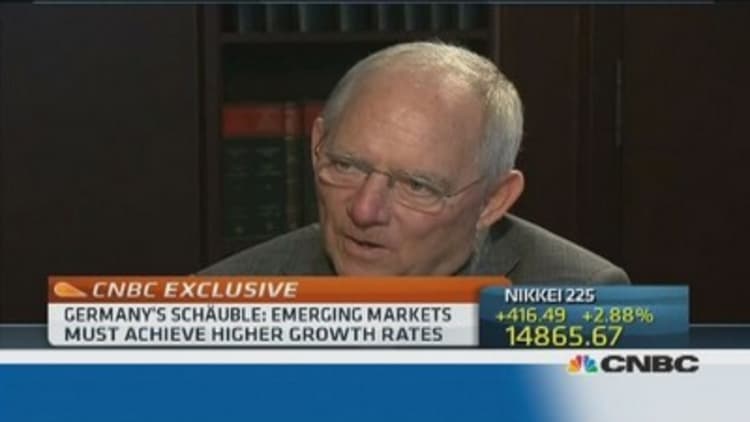
Emerging market economies should "do their own homework" on key structural reforms before they can ask for solidarity from other developed countries, Germany's Finance Minister Wolfgang Schaeuble told CNBC.
Speaking ahead of the meeting of the G-20 finance ministers in Sydney, Australia, Schaeuble stressed that the developed world should assume responsibility for emerging countries but "everybody must understand that they must first of all do their own homework and then countries can demand solidarity from others."
The group of 20 leading global economies is gathering amid market turmoil and uncertainty surrounding the central bank and economic policies of several emerging countries, including South Africa and Turkey.
The German finance minister, one of the strongest proponents of austerity to help countries to correct their economies, said he was speaking from experience following the euro zone debt crisis. But he warned that the emerging economies' central banks should tread carefully.
(Read more: Recovery in euro zone business activity loses steam)
"We have had the problem recently in Europe and we have always used monetary policy as a tool to gain some time, " Schaeuble said.
"But this time (it ) should not be misused to avoid solving the problems."
Turning his attention closer to home, Schaeuble said any further, limited aid for Greece would not include another debt haircut. Reports have surfaced repeatedly over the past months suggesting that a new package could include a further debt writedown.
In 2012, Greece's creditors took a 53.5 percent haircut on their debt holdings as part of an aid package agreed for the country but Schaeuble insisted that this was a "one-off".
"If Greece were to need further, limited, financial assistance at the end of this year when the current aid package expires, then we are prepared to do this, provided that Greece has met its obligations by then….Greece is on the right path," he said.
"But in the same way that we had a haircut of 53.5 percent for private investors holding Greek government debt, there will be no such haircut, we said then it was a one-off and it will not be repeated."
(Read more: German firms most optimistic in 2.5 years)
Schaeuble said Greece, and the rest of the euro zone, were on the right path.
"The nervousness of the financial markets as to whether the euro will remain a stable currency has been overcome and that is perfectly correct because the euro remains one of the world's stable currencies," he said.
"We have overcome the recession and overall the euro zone has now returned to a growth path, moderate growth admittedly, but this is better than recession."
He stressed the need for countries to continue to implement structural reforms, including Germany which has recently come under criticism for its high current account surplus.
(Read more: Germany's surplus not harming euro zone - Eurogroup)
Germany has had a current account surplus in excess of 6 percent of its gross domestic product since 2007, meaning it exports far more than it imports from the rest of the world.
The Ifo think tank said last month that the surplus probably hit a new record in 2013 of about $260 billion, even greater than China.
Following criticism from the United States that Germany is relying too heavily on exports, the European Commission decided in November to analyse in detail whether the surplus was a sign of a serious economic risk in the making.
"I am not concerned about this as we have not manipulated anything," Schaeuble said
"It is the expression of our economic efficiency and performance," he said.
"We are also now being criticized by the OECD which says we must do more for our growth,we must take care that domestic demand does not grow too much and we must do more for investments and such things."
Schaeuble added: "Three months ago, the OECD was very critical about our surpluses. Sometimes I think that these international bodies should be aware of what they said three months ago."
Follow us on Twitter: @CNBCWorld

